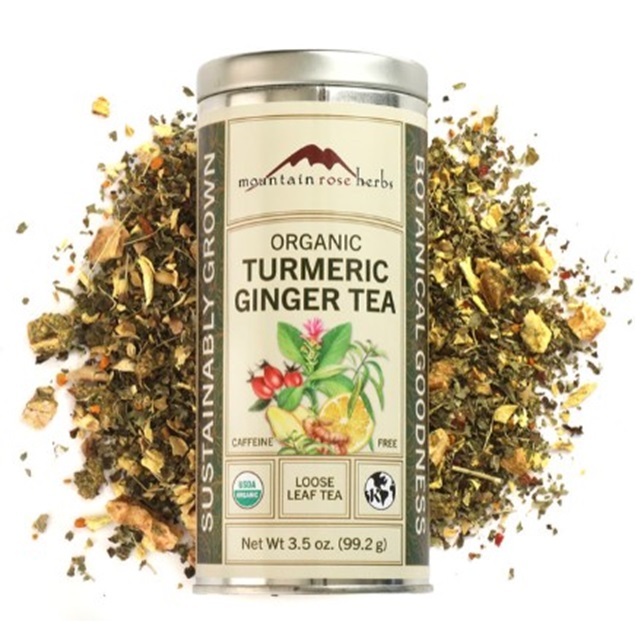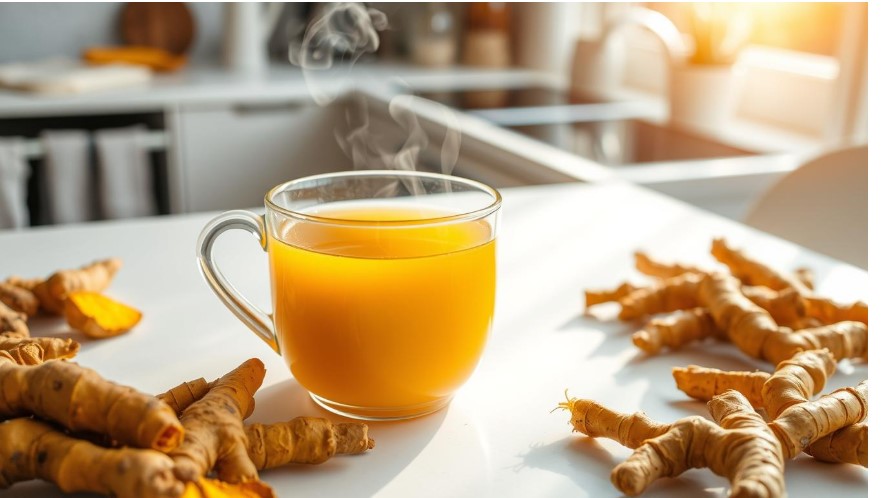Turmeric Tea: Benefits and How to Make It at Home
Turmeric, a vibrant golden spice, has long been valued in traditional medicine. Its active compound, curcumin, is known for its anti-inflammatory and antioxidant properties. Turmeric tea, or “golden milk,” is now a popular choice for those looking to add this superfood to their daily routine.
This guide delves into the origins and benefits of turmeric tea. It also offers a step-by-step guide on how to make it at home. Whether you’re looking for a natural remedy for inflammation, a wellness boost, or a tasty drink, turmeric tea is a versatile and accessible option.

Key Takeaways
- Turmeric, a vibrant spice with a long history in traditional medicine, is the key ingredient in turmeric tea.
- Curcumin, the active compound in turmeric, is known for its potent anti-inflammatory and antioxidant properties.
- Turmeric tea, or “golden milk,” has gained popularity as a natural health beverage with a range of potential benefits.
- This guide will explore the history, key compounds, and health benefits of turmeric tea, as well as provide a step-by-step recipe for brewing it at home.
- Incorporating turmeric tea into your daily routine can be a simple and effective way to support overall well-being.
Understanding What Makes Turmeric Tea Special
Turmeric, the vibrant yellow spice, is celebrated for its distinctive flavor and robust aroma. It has a rich history in traditional medicine systems like Ayurveda. This versatile plant has been revered for centuries as a potent natural remedy. Its unique properties make turmeric tea a standout beverage.
The History of Turmeric in Traditional Medicine
Turmeric originated in ancient India and has been celebrated for its medicinal qualities. In Ayurvedic practice, this curcuminoid-rich root has been used to address a wide range of health concerns. These include inflammation and digestive issues. The plant’s traditional uses have been documented in ancient texts, showcasing its enduring importance in traditional medicine.
Key Compounds in Turmeric
At the heart of turmeric’s remarkable properties are its bioactive compounds, particularly curcumin. Curcumin is the primary curcuminoid responsible for turmeric’s vibrant color and many of its therapeutic benefits. This powerful antioxidant has been extensively studied for its anti-inflammatory, antimicrobial, and neuroprotective effects. It makes turmeric a key player in its transition from ancient remedy to modern superfood.
From Ancient Remedy to Modern Superfood
As scientific research has delved deeper into the traditional uses of turmeric, its reputation as a health-boosting powerhouse has only grown. Today, turmeric tea is widely celebrated as a versatile and beneficial beverage. Enthusiasts enjoy its rich flavor, soothing properties, and potential to support overall well-being.

“Turmeric has been used for thousands of years in Ayurvedic medicine to treat a variety of conditions, from inflammation to digestive issues.” – Dr. Aisha Sethi, Board-Certified Dermatologist
Health Benefits of Turmeric Tea
Turmeric tea is renowned for its anti-inflammatory properties and antioxidant effects. These benefits come from curcumin, turmeric’s active compound. Research shows turmeric can fight inflammation, a major cause of chronic diseases.
It also supports digestive health and boosts the immune system. Turmeric’s antioxidants aid in a healthy gut by reducing inflammation and promoting beneficial bacteria. Drinking turmeric tea regularly can strengthen the body’s defenses against illness and infection.
The anti-inflammatory and antioxidant properties of turmeric offer a wide range of health benefits. These include:
- Reduced risk of chronic diseases like heart disease, cancer, and Alzheimer’s
- Improved joint health and reduced symptoms of arthritis
- Enhanced brain function and cognitive performance
- Improved skin health and reduced signs of aging
Adding turmeric tea to your daily routine is a simple way to enjoy these health benefits and support your overall well-being.

“Turmeric tea is a true powerhouse of natural health benefits. Its potent anti-inflammatory and antioxidant properties make it a must-have in any wellness routine.”
| Health Benefit | Mechanism of Action | Key Findings |
|---|---|---|
| Anti-inflammatory Properties | Curcumin, the active compound in turmeric, inhibits the production of inflammatory molecules like cytokines and enzymes. | Studies have shown turmeric to be as effective as anti-inflammatory drugs in reducing inflammation, with fewer side effects. |
| Antioxidant Effects | Turmeric’s antioxidants neutralize free radicals and prevent oxidative stress, which can contribute to chronic diseases. | Turmeric has been found to have higher antioxidant capacity than many other spices and herbs, making it a potent weapon against oxidative damage. |
| Digestive Health | Curcumin can help reduce gut inflammation, support the growth of beneficial gut bacteria, and improve overall digestive function. | Regular consumption of turmeric tea has been linked to reduced symptoms of digestive disorders, such as irritable bowel syndrome (IBS). |
| Immune System Boost | Turmeric’s anti-inflammatory and antioxidant properties can help strengthen the body’s natural defenses against illness and infection. | Studies have shown that turmeric can enhance the activity of immune cells and increase the production of antibodies, leading to improved immune function. |
Essential Ingredients for Perfect Turmeric Tea
Making the perfect cup of organic turmeric tea involves choosing the right ingredients. Whether you prefer fresh or dried turmeric root, knowing the differences is crucial. It affects the flavor and health benefits of this ancient elixir.
Fresh vs. Dried Turmeric Root
Fresh organic turmeric root has a more vibrant, intense flavor than dried turmeric. Its natural oils and compounds are more potent, offering a richer, more aromatic tea. Yet, dried turmeric is more convenient and lasts longer, appealing to many home brewers.
Supporting Ingredients and Enhancers
- Black pepper significantly boosts the bioavailability of turmeric’s active compound, curcumin.
- Ginger adds a warm, spicy note and enhances curcumin absorption.
- Coconut oil or honey can add a subtle sweetness and creaminess, balancing turmeric’s earthy flavors.
Quality Considerations
Choose organic and high-quality turmeric and ingredients for the best results. Opt for turmeric that is vibrant and has a pleasant aroma. Avoid discolored or smelly turmeric, as it may be of poor quality.
“Turmeric is a spice that has long been used in traditional medicine, and its potential health benefits have made it a popular modern-day superfood.”
Step-by-Step Guide to Brewing Turmeric Tea
Making the perfect homemade turmeric tea is simpler than you might think. With just a few ingredients and some basic knowledge, you can craft a soothing, golden drink. This drink is full of health benefits. Let’s explore how to brew your turmeric tea at home step by step.
Gathering the Essentials
To brew a delicious turmeric tea, you’ll need a few things:
- Fresh or dried turmeric root
- Water
- Honey, maple syrup, or another sweetener (optional)
- Lemon or other citrus (optional)
- Spices like ginger, cinnamon, or black pepper (optional)
Preparing the Tea
Here’s how to brew your turmeric tea:
- Boil 2-3 cups of water in a saucepan.
- Add 1-2 teaspoons of fresh turmeric root or 1-2 teaspoons of dried turmeric powder to the boiling water.
- Lower the heat and let the turmeric simmer for 5-10 minutes. This allows the flavors to meld into the water.
- Strain the tea through a fine-mesh sieve to remove any turmeric particles.
- Stir in a teaspoon or two of honey, maple syrup, or your preferred sweetener, if desired.
- Add a squeeze of fresh lemon juice or a slice of lemon for an extra burst of flavor.
- Optionally, you can also add a pinch of ground ginger, cinnamon, or black pepper to enhance the “golden milk” flavor.
By following these steps, you can enjoy a warm, comforting cup of homemade turmeric tea. It’s full of flavor and health benefits.
The secret to perfect turmeric tea is to experiment with the turmeric to water ratio and adjust the brewing time. With a bit of practice, you’ll become a pro at brewing turmeric tea in no time!
Best Time to Drink Turmeric Tea
Timing is key when it comes to enjoying turmeric tea. The best time to drink it can vary based on your daily intake habits and circadian rhythm.
Morning vs. Evening Consumption
Many advocate for starting the day with turmeric tea. Its anti-inflammatory and antioxidant properties can gently energize you in the morning. On the other hand, drinking it in the evening can aid in relaxation and a better bedtime routine.
Your choice of when to drink turmeric tea depends on your personal needs and preferences. Try both morning and evening to find what suits your body and lifestyle best.
Optimal Dosage Recommendations
- Experts recommend a daily turmeric intake of 500-2,000 mg for general wellness.
- A typical serving of turmeric tea is 1-2 teaspoons of dried powder or 1-2 inches of fresh root per cup.
- Adjust the dosage based on your body’s response, as turmeric effects can differ from person to person.
Adding turmeric tea to your daily routine, whether in the morning or evening, can be a simple yet effective way to benefit from this ancient spice. Find the timing and dosage that suits you and enjoy the soothing and nourishing experience.
Boosting Turmeric Tea’s Effectiveness
Turmeric tea is a potent natural remedy, but its full potential can be unlocked with a few simple strategies. These strategies enhance its bioavailability and absorption. By adding specific ingredients and techniques, you can maximize the benefits of this golden elixir.
Embrace Black Pepper’s Synergistic Effect
Combining turmeric with black pepper significantly boosts its bioavailability. The compound piperine in black pepper increases curcumin absorption. Adding a pinch of freshly ground black pepper to your turmeric tea amplifies its health benefits.
Harness the Power of Healthy Fats
Turmeric is fat-soluble, meaning it’s better absorbed with healthy fats. Adding coconut oil, ghee, or full-fat milk enhances turmeric’s bioavailability. This simple addition ensures your body can fully utilize turmeric’s active ingredients.
| Ingredient | Function | Benefit |
|---|---|---|
| Black Pepper | Absorption Enhancer | Increases the bioavailability of curcumin |
| Healthy Fats (Coconut Oil, Ghee, Full-Fat Milk) | Improved Absorption | Enhances the body’s utilization of fat-soluble compounds in turmeric |
By incorporating these simple yet effective strategies into your turmeric tea routine, you can unlock its true potential. Enjoy its wide-ranging health benefits to the fullest.
Common Mistakes to Avoid When Making Turmeric Tea
Making the perfect cup of turmeric tea requires attention to detail. It’s easy to make mistakes that can affect the flavor, aroma, and health benefits. Let’s look at common issues and how to avoid them.
Temperature Control Issues
Proper temperature is key when brewing turmeric tea. Overheating can make the tea taste bitter and reduce its health benefits. On the other hand, brewing too cold can prevent the full extraction of turmeric’s oils and compounds.
Storage and Shelf Life
Keeping turmeric tea fresh and of high quality is a challenge. Improper storage can lead to spoilage and a loss of flavor preservation. It’s crucial to store the tea in an airtight container in a cool, dark place to prevent overheating and spoilage.
| Common Mistake | Potential Consequence | Solution |
|---|---|---|
| Overheating the tea | Bitter taste, loss of active compounds | Carefully monitor temperature and avoid boiling |
| Brewing at too low a temperature | Incomplete extraction of beneficial compounds | Ensure the water is hot enough to properly steep the turmeric |
| Improper storage | Spoilage, loss of flavor preservation | Store in an airtight container in a cool, dark place |
By understanding and avoiding these common pitfalls, you can ensure your homemade turmeric tea is consistently delicious, aromatic, and packed with health benefits.
Turmeric Tea Variations and Recipes
Beyond the classic turmeric tea, there are many creative ways to use this golden spice. From iced turmeric lattes to turmeric chai and golden milk smoothies, the options are vast. Let’s dive into some delightful turmeric tea variations that will excite your taste buds.
Iced Turmeric Latte
For a refreshing twist, try an iced turmeric latte. Mix brewed turmeric tea, your preferred milk, a bit of honey or maple syrup, and a pinch of cinnamon. Blend until it’s smooth, pour over ice, and savor this creamy, invigorating drink.
Turmeric Chai
Enhance your chai with turmeric’s earthy, vibrant flavor. Start with a strong black tea, then add your favorite chai spices like cardamom, ginger, and cloves, along with turmeric. Top it off with warm milk and a sprinkle of ground turmeric for a comforting, spiced turmeric chai.
Golden Milk Smoothie
For a nourishing breakfast or snack, make a golden milk smoothie. Blend turmeric tea, plant-based milk, frozen banana, almond butter, and a touch of honey or vanilla. Blend until creamy and enjoy this vibrant, creamy treat.
The beauty of these turmeric tea variations is their customizability. Feel free to experiment with different spices, sweeteners, and milk alternatives to discover your ideal flavor. Enjoy the versatility of this ancient superfood and explore the endless possibilities of turmeric tea.
Potential Side Effects and Precautions
Turmeric tea is generally safe, but it’s crucial to know about potential side effects and precautions. Turmeric has anti-inflammatory and blood-thinning properties. These can interact with certain medications and medical conditions.
Who Should Avoid Turmeric Tea
Some individuals should be cautious or avoid turmeric tea. This includes those with:
- Allergic reactions to turmeric or its compounds
- Pregnant women, due to potential interactions with pregnancy considerations
- People taking blood thinners or anticoagulants, as it may increase bleeding risk
- Those with gallbladder issues or bile duct obstruction
- Individuals with gastroesophageal reflux disease (GERD) or stomach ulcers
Medication Interactions
Turmeric can interact with specific medications. These include:
- Blood thinners (e.g., warfarin, aspirin, clopidogrel)
- Diabetes medications (e.g., metformin, glibenclamide)
- Nonsteroidal anti-inflammatory drugs (NSAIDs) like ibuprofen or naproxen
- Certain chemotherapy drugs
Before adding turmeric tea to your routine, consult a healthcare professional. This is especially important if you’re on medications or have medical conditions.
Begin with small doses of turmeric tea and observe your body’s reaction. If you experience discomfort, such as digestive issues, stop using it. Then, consult your healthcare provider.
Tips for Buying and Storing Turmeric
Turmeric, a vibrant yellow spice from the Curcuma longa plant, is vital in many cuisines and herbal remedies. Choosing high-quality organic turmeric powder or fresh turmeric root is essential for perfect turmeric tea. Here are key tips for buying and storing this versatile ingredient.
Choosing the Right Turmeric
- Choose turmeric that is bright, vivid yellow, indicating freshness and potency.
- Prioritize organic turmeric powder or fresh turmeric root for higher curcumin content.
- Verify the packaging for origin, processing, and expiration date to ensure freshness.
Proper Storage Techniques
Keeping turmeric fresh and potent is crucial for its full benefits. Follow these storage tips:
- Store organic turmeric powder in airtight storage containers in a cool, dry place, away from sunlight.
- For fresh turmeric root, wrap it in a damp paper towel and refrigerate, staying fresh for up to two weeks.
- Avoid excessive heat, moisture, or air to preserve its active compounds and flavor.
| Storage Method | Shelf Life |
|---|---|
| Organic Turmeric Powder | 6-12 months |
| Fresh Turmeric Root | 2 weeks |
By adhering to these guidelines, your turmeric will stay fresh, potent, and ready to enhance your tea into a wellness elixir.
“Turmeric is a true powerhouse in the world of natural remedies, and understanding how to select and store it properly is key to unlocking its full potential.”
Whether you prefer organic turmeric powder or fresh turmeric root, adding this remarkable spice to your daily routine can be rewarding and health-promoting.
Scientific Research Behind Turmeric’s Benefits
Turmeric, known for its golden color and unique taste, has been extensively studied. Clinical studies have highlighted its health benefits, solidifying its status as a superfood. This ancient remedy has garnered significant attention in the scientific community.
The focus of much research is on curcumin, a key component of turmeric. It has been found to have strong anti-inflammatory, antioxidant, and neuroprotective effects. These properties make it a valuable asset in managing chronic diseases like arthritis, heart disease, and Alzheimer’s.
| Health Outcome | Relevant Findings |
|---|---|
| Inflammation Reduction | Curcumin has been found to be as effective as some anti-inflammatory drugs in reducing inflammation, without the associated side effects. |
| Cognitive Function Improvement | Studies suggest that curcumin may enhance brain function and reduce the risk of age-related cognitive decline. |
| Diabetes Management | Curcumin has been shown to improve insulin sensitivity and help regulate blood sugar levels in individuals with type 2 diabetes. |
Research into turmeric and its compounds continues to expand, exploring its potential in various medical fields. As evidence grows, turmeric’s therapeutic benefits become more evident. This opens up new possibilities for its use in modern healthcare.
“Turmeric’s remarkable therapeutic potential is just the tip of the iceberg. As we unravel the complexities of this remarkable spice, the door to a whole new frontier of natural medicine continues to open.”
Conclusion
Turmeric tea stands out as a holistic health beverage, rich in history and natural benefits. It has evolved from ancient traditional medicine to a modern superfood. This golden tea offers a wealth of wellness opportunities.
If you’re looking to add natural remedies to your wellness routine, or just enjoy its flavor and aroma, turmeric tea is perfect. Learning to brew the perfect cup unlocks its full potential. You’ll experience the benefits of its numerous therapeutic properties.
As you delve deeper into turmeric tea, try different variations and stay updated with research. Find what works best for you. Let this ancient remedy become a valued part of your daily wellness routine.
FAQ
What is turmeric tea and what are its benefits?
Turmeric tea is a flavorful drink made from turmeric, known for its anti-inflammatory and antioxidant properties. It supports the immune system, aids in digestion, and can help with pain relief.
How does turmeric tea differ from other tea varieties?
Turmeric tea is distinct due to its unique flavor and curcumin content. Curcumin gives turmeric its golden color and many health benefits.
What are the key ingredients in turmeric tea?
Turmeric tea includes high-quality turmeric, often with ginger, black pepper, and cinnamon. Adding coconut oil or dairy-free milk enhances curcumin absorption.
How do I properly brew turmeric tea at home?
To brew turmeric tea, start with fresh or dried turmeric. Simmer it in water for 10-15 minutes. Customize with spices, sweeteners, and healthy fats to your liking.
When is the best time to drink turmeric tea?
Enjoy turmeric tea any time, but it’s great in the morning or evening. Morning tea boosts energy and wellness. Evening tea aids in relaxation and sleep.
Are there any potential side effects or precautions to consider with turmeric tea?
Turmeric is usually safe, but some may experience stomach issues or heartburn with large doses. Those with blood disorders or gallbladder problems should talk to their doctor before drinking turmeric tea.
How can I maximize the effectiveness of my turmeric tea?
Add black pepper to increase curcumin absorption. Pairing turmeric tea with healthy fats like coconut oil boosts its benefits.
